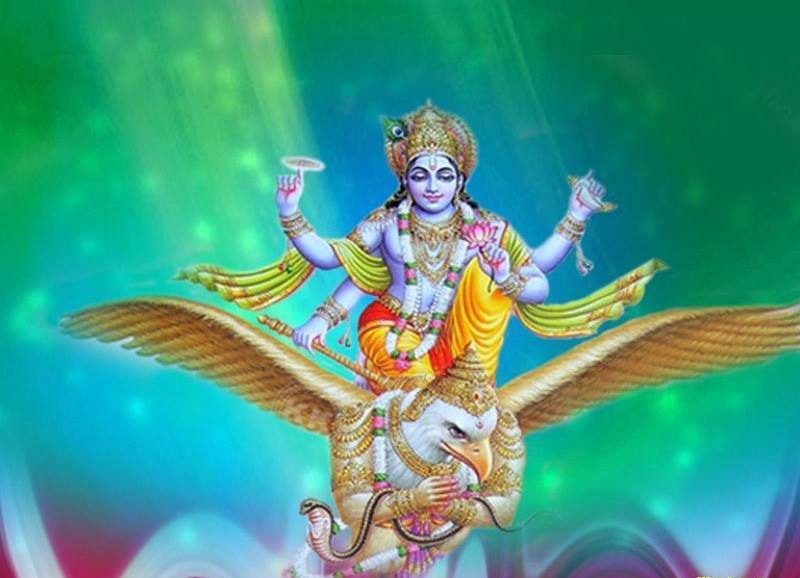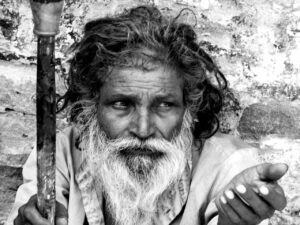Urgent Mission:
Once there was a sage named Galava who had to go on an urgent and important mission. He spoke to his friend Garuda, the Great Eagle, who offered to fly him to his destination.
Change of Plans:
After they had flown a long distance, Galava said to his friend that he now felt that there was no need to travel to that destination. So he asked Garuda to return.
Rest and Respite:
Garuda said, “There is a hill on the sea coast ahead; we will rest there, have some food, and return.” Descending on the hill, they saw a woman, Shandili, who had on her face the glow of some ineffable energy because of her performing austerities.
Hospitality and Rest:
They saluted her most respectfully, and she offered them food, wholesome and satisfying. There on the earth, they both fell into a deep sleep.
The Punishment:
When Garuda awoke, he saw that his wings were severed from his body, and without them he looked like a lump of flesh. It seemed to be some kind of punishment.
The Cause of the Punishment:
The sage asked Garuda, “Did you think anything offensive about the woman?” Garuda said, “I just wondered why this ascetic woman should live in this forsaken place in the midst of a hill performing austerities? There are so many holy places of pilgrimage, and she should be staying there.”
Realization and Apology:
Then he realized that wherever saintly persons or Vaishnavas live, that is the place of pilgrimage. For this offensive thinking, he lost his wings. Later, he sought forgiveness from Shandili and got back his wings.
Moral of the Story:
In Srimad Bhagvatam 1.13.10, King Yudhistira glorifies Sri Vidura saying:
“bhavad-vidhaa bhaagavataas / tirtha-bhutaah svayam vibho tirthi-kurvanti tirthaani / svaanta-sthena gadaabhrtaa”
“My Lord, devotees like your good self are verily holy places personified. Because you carry the Personality of Godhead within your heart, you turn all places into places of pilgrimage.”
Lessons to be Learned:
- Respect for Vaishnavas: Wherever saintly persons reside, that place becomes a holy place of pilgrimage. We should respect them and never think ill of their chosen place of residence.
- Power of Austerity: The woman, Shandili, through her austerities, gained immense spiritual energy. This shows the power of sincere austerity and devotion.
- Consequences of Offensive Thinking: Garuda’s loss of wings signifies the serious consequences of having offensive thoughts towards devotees. We must guard our thoughts and speech to avoid such offenses.
Teachings from Srila Prabhupada’s Books:
In his purports, Srila Prabhupada often emphasizes the importance of association with pure devotees and respecting them. In Bhagavad Gita 9.30, he explains:
“Even if one commits the most abominable action, if he is engaged in devotional service, he is to be considered saintly because he is properly situated in his determination.”
This highlights that the holiness of a person is determined by their devotion to Krishna, not by their external circumstances or past actions.
Prayer:
Dear Lord Krishna,
Please grant us the wisdom to respect all Your devotees and recognize their holiness, regardless of their external conditions. Help us to always think and speak favorably about Your devotees and protect us from the offenses that may distance us from You. May we always remember that the true holy place is where Your pure devotees reside, and may we seek their association and blessings.
Hare Krishna, Hare Krishna, Krishna Krishna, Hare Hare Hare Rama, Hare Rama, Rama Rama, Hare Hare
Conclusion:
The story of Garuda and Shandili teaches us the profound importance of respecting devotees and recognizing their sanctity. By understanding and appreciating the power of devotion and austerity, we can cultivate a respectful and humble attitude, bringing us closer to the divine grace of the Supreme Lord.



